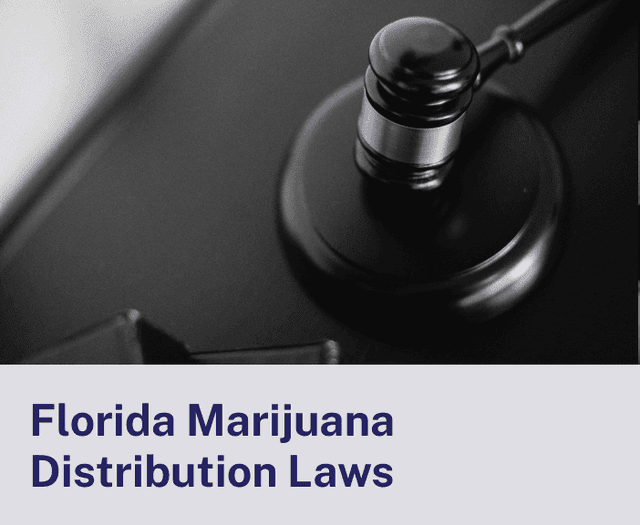Florida Marijuana Distribution Laws
- Florida Cannabis
- Florida Marijuana Laws
- Limitations
- Distribution Laws
What Is Possession With Intent To Distribute Marijuana in Florida?
According to Section 893.13 of the Florida Statutes, persons charged with marijuana possession with intent to distribute could face severe legal repercussions. Marijuana possession means that a person holds any amount of marijuana illegally. Possession of up to 20 grams of cannabis in Florida is a first-degree misdemeanor. An offender could be charged for possession with intent to distribute if there is proof that they intended to transfer marijuana products to others, whether or not remuneration is involved. In Florida, marijuana possession with intent to distribute means carrying cannabis products with the aim of transferring them to another individual or entity.
Can You Enter a Dispensary at 18 in Florida?
Yes. As stipulated in Section 381.986 of the Florida Statutes, registered medical marijuana patients in Florida must be up to 18 years old before they can legally obtain marijuana products from dispensaries. Caregivers must buy cannabis products on behalf of patients below 18 years. There are no recreational marijuana dispensaries in Florida. Cannabis is classified as a Schedule I controlled substance with a high potential for abuse under Section 893.03 of the Florida Statutes. Therefore, its use for recreational purposes is prohibited in the state.
Can You Enter a Dispensary Without a Card in Florida?
No. Patients must present their Medical Marijuana Use Registry identification cards (MMUR ID cards) and state-issued photo identification before purchasing cannabis products at dispensaries. Since recreational marijuana is illegal in Florida, only qualified patients and caregivers registered with the Florida Office of Medical Marijuana Use (OMMU) can legally obtain cannabis products at dispensaries.
What Are the Penalties for Possession With Intent To Distribute First Offense in Florida?
According to Section 893.13 of the Florida Statutes, marijuana possession with intent to distribute is a third-degree felony punishable with a $5,000 fine and a five-year prison term. A repeat offender charged with marijuana possession with intent to distribute may be imprisoned for up to 10 years. The punishment for possession with intent to distribute marijuana is more severe if an offender is caught within 1,000 feet of a school, community center, public recreational facility, or park. According to Section 893.13(1)(c) of the Florida Statutes, such offenders commit second-degree felonies punishable by 15 years imprisonment and $10,000 fines. A repeat offender charged with marijuana possession with intent to distribute around a school, public park, or recreational center may face a jail term of 10 to 30 years.
Federal law prohibits the deliberate possession of marijuana with intent to distribute or transfer to other persons. The punishment an offender could face at the federal level depends on the quantity of marijuana found with them. According to Title 21, Section 841 of the United States Code, possession of up to 1,000 kilograms of marijuana is punishable by up to 10 years imprisonment, a $10,000,000 fine, or both. If bodily injury or death occurs from the use of marijuana obtained from an offender charged with possession with intent to distribute, the person may face a more severe penalty.
Is It Legal To Sell Weed in Florida?
Medical marijuana treatment centers are allowed to sell low-THC cannabis products to registered medical marijuana patients in Florida. Selling marijuana means delivering or transferring marijuana products to another person for money. Only persons diagnosed with specific medical conditions can obtain Medical Marijuana Use Registry identification cards (MMUR ID cards) from the Florida Department of Health, which qualifies them for medical marijuana. Per Section 318.986 of the Florida Statutes, medical marijuana treatment centers cannot sell over 2.5 ounces of smokable forms of cannabis to patients within a 35-day timeline unless approved by the Florida Department of Health.
How To Sell to Dispensaries in Florida?
As provided in Section 381 of the Florida Statutes, medical marijuana treatment centers are allowed to cultivate cannabis plants, process them, and dispense marijuana products to patients. Florida law does not permit treatment centers to purchase marijuana supplies from other businesses or individuals. In addition, Florida law does not allow residents to cultivate marijuana plants at home or supply them to dispensaries.
How To Get a Distribution License in Florida
Marijuana distribution licenses usually allow businesses or individuals to store cannabis products and transport them to retail establishments and other registered marijuana businesses. In Florida, the only category of marijuana businesses allowed to operate is medical marijuana treatment centers. The state does not issue marijuana distribution licenses to business entities or individuals.
Speak With a Cannabis Attorney
Request AssistanceAre You Arrested on Cannabis Charges?
Call the 24/7 Support Line